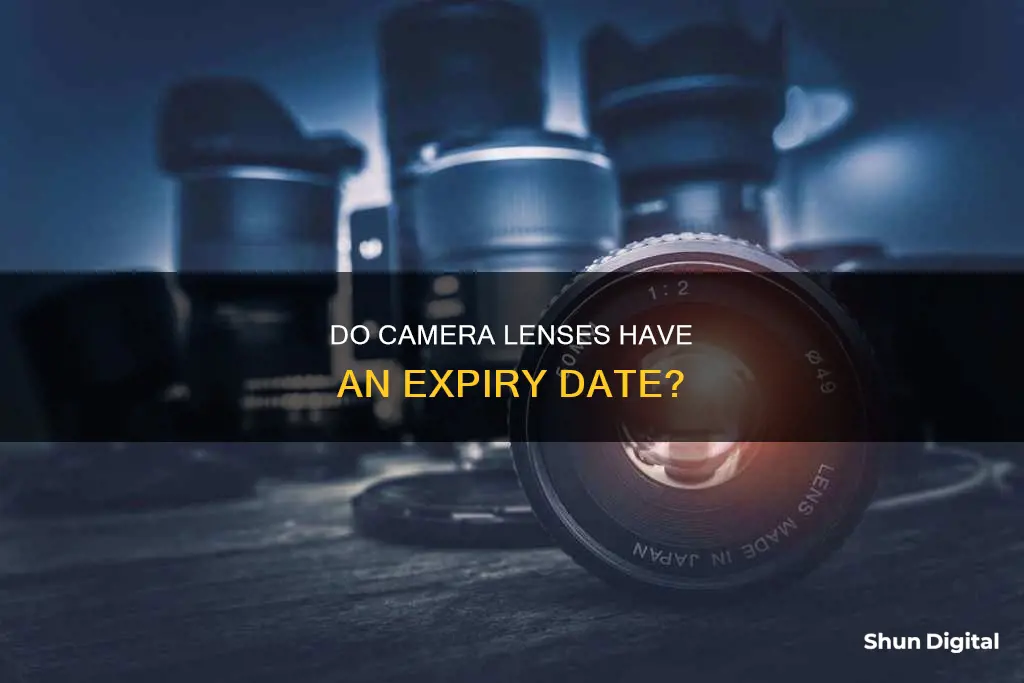
Camera lenses can wear out over time, but their longevity depends on a variety of factors. The quality of the lens and how well it is cared for are key considerations. A well-built, well-maintained lens can last for decades, outliving other camera components such as shutters, apertures, and sensors.
The lifespan of a lens is influenced by its usage and the environment in which it is stored. Frequent attachment and detachment of the lens can reduce the life of gold-plated contacts at the rear. High-end lenses, made from top-quality materials, generally have a longer lifespan than cheaper alternatives.
Additionally, individual components within a camera lens have specific wear and tear rates. For instance, repeated zooming in and out can cause the glass elements to become dislodged over time. Storing the camera in a humid environment can shorten the lifespan of rubber parts. Autofocus and image stabilisation systems are also subject to failure, and their repair or replacement may be challenging due to the discontinuation of certain lens models.
To prolong the life of a camera lens, it is recommended to use a lens cap when the camera is not in use, store the camera in a bag, clean the lens with a microfiber cloth, and avoid exposing the camera to extreme temperatures.
| Characteristics | Values |
|---|---|
| Do camera lenses wear out? | Yes |
| How long do they last? | It depends on the quality of the lens and how well it is taken care of. Usually, you should have at least 200,000 pictures before your lens wears out. |
| What can shorten their lifespan? | Water, moisture, sand, dust, physical damage, extreme temperatures |
| How can you tell if a camera lens is worn out? | Dark spots or scratches on the lens, inability to focus, cracked lens |
| How can you prolong the life of a camera lens? | Use a lens cap, make good use of a camera bag, clean the lens with a microfiber cloth, keep the camera away from extreme temperatures |
What You'll Learn
- Lenses can last for decades if they are well-built and well-maintained
- The quality of the lens and how well it is cared for will determine its lifespan
- A lens's lifespan can be shortened by water, moisture, sand, dust, and physical damage
- To prolong the life of a lens, use a lens cap, a camera bag, clean it with a microfiber cloth, and keep it away from extreme temperatures
- Lenses with autofocus, aperture controls, and image stabilisation are more likely to wear out over time

Lenses can last for decades if they are well-built and well-maintained
While a camera lens can wear out over time, especially if it is not a high-quality lens, its life can be extended with good care. Here are some tips to help prolong the life of your camera lens:
- Use a lens cap when the camera is not in use to protect the lens from dust and moisture.
- Invest in a camera bag to protect the lens and camera from small particles and physical damage.
- Clean the lens with a microfiber cloth before and after every photo shoot and before putting the camera back in the bag.
- Keep the camera away from extreme temperatures to avoid damaging the lens.
Additionally, proper storage of camera lenses is essential when they are not in use. If you live in an area with high humidity, consider investing in a dry cabinet for storage. If not, you can keep the camera lens in a camera bag with silica gel packets inside to absorb any additional moisture.
By following these tips and guidelines, you can ensure that your camera lenses last for many years, even decades, and continue to capture beautiful photographs.
Compatibility of Pentax Lenses with Fujica Cameras
You may want to see also

The quality of the lens and how well it is cared for will determine its lifespan
The lifespan of a camera lens depends on a variety of factors. In a perfect world, a lens will last until you reach the "shutter count" of your camera, which can be found in the instruction manual. However, several things can shorten its lifespan, including water and moisture, sand and dust, and physical damage to the camera.
The quality of the lens is a significant factor in its lifespan. High-end lenses will have a longer life than cheaper ones since they are made with top-quality materials. For example, high-end camera lenses have a metallic casing, while cheaper lenses have a plastic body. Therefore, a plastic lens is more likely to break if dropped.
Additionally, the way a lens is cared for will also determine its lifespan. Proper storage is essential—if a camera lens is not stored properly when not in use, there is a chance it can go bad. Humidity can reduce the lifespan of a camera lens, so it is recommended to use a dry cabinet for storage if you live in a humid area. It is also important to clean the camera lens after each outdoor shoot and to keep the camera away from extreme temperatures.
Other factors that contribute to the lifespan of a camera lens include its usage and the frequency with which it is attached and detached from the camera body. Frequent usage can cause wear and tear on the various components of the lens, such as the glass elements, ribbon cable, and rubber parts. Attaching and detaching the lens from the camera body can lower the life of the gold-plated contacts at the rear of the lens, as they are designed for a specific number of insertions.
In summary, the lifespan of a camera lens is influenced by both its quality and the care it receives. A high-quality lens that is well-maintained can last for decades, while a lower-quality lens that is not properly cared for will have a shorter lifespan.
Sigma Lenses: Compatible with Full-Frame Cameras?
You may want to see also

A lens's lifespan can be shortened by water, moisture, sand, dust, and physical damage
Water damage to a camera lens can occur if the lens is submerged in water or used heavily in rain. If this happens, it is important to act quickly to minimise the risk of damage. The first step is to switch off the camera to avoid mixing electricity and water. The next step is to check for moisture, water, or condensation in the lens. If the lens is completely soaked, shake off as much water as possible. Remove the lens from the body, pointing the camera towards the floor to avoid water entering the sensor area. Place a protective cap on the body to minimise issues. Inspect the lens again, paying close attention to the type of water the lens was exposed to, as saltwater and impure water can cause more damage. Rinse the lens with bottled water if saltwater or impure water was involved.
To remove water from the lens, place the lens in an airtight container with silica gel or uncooked rice, ensuring the lens is facing down. Leave the container in a warm area for at least 48 hours, checking for improvements. If professional help is not sought, it is important to note that the more time water stays inside the lens, the more damage it can cause.
Moisture can also affect the lifespan of a lens, especially in humid environments. Humidity can reduce the lifespan of a lens, so it is recommended to use a dry cabinet to store lenses if living in a humid area. Silica gel packets can also be placed inside a camera bag to absorb moisture.
Sand and dust can enter a lens and cause issues with its mechanics. It is important to keep lenses away from sandy and dusty environments, and to regularly clean lenses to prevent a build-up of dust.
Physical damage, such as scratches on the lens glass or cracks on the lens body, can also shorten a lens's lifespan. Scratches on the front or back glass element will require servicing. Older metal lenses are generally more durable than plastic lenses, which are more prone to breaking if dropped.
Why Are Camera Lenses Round?
You may want to see also

To prolong the life of a lens, use a lens cap, a camera bag, clean it with a microfiber cloth, and keep it away from extreme temperatures
Camera lenses can last for a long time, but they do not last forever. To ensure that your lenses last for as long as possible, there are several things you can do.
Firstly, always use a lens cap when your camera is not in use. This will protect your lens from the elements, such as dust and moisture, which can cause damage. Most cameras come with a lens cap, but if yours does not, it is easy to find a replacement.
Secondly, invest in a good camera bag. This will protect your lens and camera from small particles and physical damage. Using a bag that is specifically made for your camera's dimensions will offer the most reliable protection.
Thirdly, it is important to clean your lens regularly with a microfiber cloth. Make a habit of cleaning your lens before and after every photoshoot, as well as before you put your camera away.
Finally, avoid exposing your camera to extreme temperatures. Do not bring your camera from a warm setting into a cold one, or vice versa, as this can cause condensation, which can lead to fungus or permanent moisture marks. Instead, allow your camera to warm up or cool down slowly.
By following these simple steps, you can help prolong the life of your camera lens and ensure that it remains in good condition for years to come.
Camera Lenses: Expensive, Fragile, and Worthy of Insurance Coverage
You may want to see also

Lenses with autofocus, aperture controls, and image stabilisation are more likely to wear out over time
Autofocus motors have a finite lifespan. The Micro USM type, found in plastic mount lenses and the 50mm F1.4, has a very short lifespan due to the way it works and how surfaces wear out. They will squeak before they fail. Ring USM, found in older lenses, lasts a lot longer.
The aperture can also fail. Aperture blades can break, and the aperture can try to wind past fully open and eventually jam. The USM motor can also fail due to a loss of internal contact pressure.
The image stabilisation (IS) system can also wear out over time. IS lenses are more likely to suffer from decentering issues, where the cams and linkages that move and align the lenses develop a wobble and cause misalignment.
In addition to mechanical wear and tear, lenses can also suffer from degradation due to factors such as heat, friction, and humidity. The glass elements may get dislocated over time, and the ribbon cable inside the lens may wear out. Humidity can also cause rubber parts to wear out more quickly.
To prolong the life of your lenses, it is important to store them properly when not in use, especially in humid environments. A dry cabinet can help maintain the temperature and humidity, or you can use silica gel packets in your camera bag. Regular cleaning and maintenance can also help keep your lenses in good condition.
Olympus 4/3 Camera Lenses: Discontinuation and What's Next
You may want to see also
Frequently asked questions
Yes, camera lenses can wear out over time, especially if they are not high-quality lenses or are not properly maintained.
The lifespan of a camera lens depends on various factors, such as usage, quality, storage conditions, and proper care. On average, a camera lens should last for at least 200,000 pictures before wearing out.
Several factors can shorten the lifespan of a camera lens, including water, moisture, sand, dust, physical damage, extreme temperatures, and frequent attachment and detachment from the camera body.
To prolong the life of your camera lens, use a lens cap when not in use, store it in a camera bag, clean it regularly with a microfiber cloth, and avoid exposing it to extreme temperatures.







